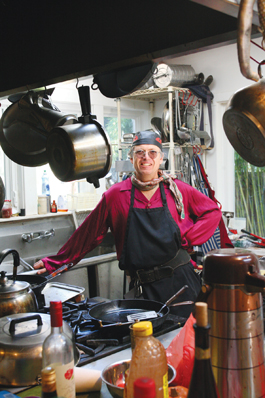home | metro santa cruz index | santa cruz county restaurants | review

Photograph by Carlie Statsky
Mo Joe Man: Joseph Schultz, the pied piper of India Joze, says his Eastern fusion restaurant was about food that was 'good enough for anyone and cheap enough for everyone.'
After the Rapture
A talk with India Joze shaman/chef Joseph Schultz recalls the sparkle of our collective culinary pilgrimage eastward
By Christina Waters
Some divide the cultural climate of Santa Cruz into "before the quake" and "after the quake." Others know better. There was the 25-year reign of India Joze. And then there's now. We may all have our lascivious memories of opulent Calamari Festivals past, but no one is more interested in what it all meant than the founding chef himself. "It's no accident that the Slow Food movement arose in Italy just as attendance at Catholic Mass declined," says Joseph Schultz over a triple espresso. The "religion of food" has now devolved into an elitist competition in the opinion of the founding entrepreneur of India Joze restaurant, a wellspring of global grazing in the '80s and '90s. Starting up years ago as "an exotic food guy," Schultz kept searching for the next extreme flavor. His anthropological inquiry convinced him that "when religion declines, food consciousness arises. My restaurant started out as full-blown religious devotion. We [Schultz, his partners and scores of co-workers] did amazing things. No matter what it cost—it had to be perfect." For an article in Gastronomica, Schultz wrote, "We made our own ketchups, salsas, chutneys, curry pastes, jams, and pickles, because, like the act of praying, those acts had the power to transport us to a sacred world." Joze offered a glimpse of Paradise: "an Eden before it was spoiled."
Others might remember India Joze as something rather earthier, a community hot spot where the food was always an adventure. I recall the ethereal pink shrimp chips, the lusty hash browns, the incendiary chutneys and sambals, and calamari done a million unthinkable ways, all of them incandescent and heady with the perfume of other worlds.
Leaving an indelible imprint upon our collective hearts, minds and taste buds, Schultz sold the business seven years ago and has proceeded to keep himself almost as busy in "retirement" as he was wok-ing up a storm for a quarter century. He caters private events and public performances, leather apron and Hollywood-size machete still part of the act. He leads ethno-gastronomic tours to Bali and has been part of the Cabrillo College culinary arts program for almost a decade.
Today's food scene elicits a mixed response from the master chef. "The community of belief has become fractured," he says. There was a time when "everyone went to Joze," he reminds me. "That was a time when it was actually possible to do that—have a place where everyone went." It was a star-crossed intersection of interests—the team invested in creating Joze, and those invested in experiencing it. "Like theater," he notes, invoking a well-worked analogy for the visual and flavor pyrotechnics of the former restaurant, "it depended on its audience as much as its players. Without this community of believers, we couldn't have done it."
Admitting that he's an "uneasy fit" in the world of step-by-step vocational schooling, Schultz is more interested in the phrasing of the culinary composition than in note-perfect execution. "I'm not a trainer," he protests. "I'm an educator."
In his restaurant days, Schultz often visited far-flung regions to intensify his flavor vision, a habit he continues through summer workshops in the coffee plantations, vanilla groves and spice fields of Bali. "Everything there is in season all the time. So the challenge is, how to create specialness in a seasonless culture?" Good question, and one appropriate to ask in our current globalized economy. In Bali, that sense of renewal, he says, is created by ritual. I consider the West's current obsession with artisanal oldways, heirloom botanicals and heritage breeds of poultry: rococo revival as liturgical surrogate. There's much food for thought here.
When he's not in faraway locations, or teaching or catering, Schultz does indeed cook for his family of three. "That's a completely different thing," he smiles. "Variety is not part of the game. All creativity comes out of the destruction of order." At home, presumably, the point is to maintain order. "And I make a lot of popcorn," he concedes. "Popcorn with Brewer's yeast."
His favorite cuisine? That's easy. "It's always the food I haven't had that most interests me," he says. Still restless after all these years, Schultz acknowledges that "the restaurant business was the only thing that engaged my various talents. I can't imagine any other field that would have been as interesting—I mean, at the peak we were turning out 1,200 dinners a night."
India Joze powered Schultz's zeal to create food "good enough for anyone and cheap enough for everyone." Today's class hierarchy has, in his opinion, messed with that formula. "Wasn't it naive of us to believe that there should be equality?" he asks with a flash of contempt. Then he calms down. "An explorer opens doors—that's what I'm still trying to do."
With fantasies of steaming calamari in gado gado sauce staining my memory, I am in his debt.
CAHM 167 'Ethnic Cooking in Bali,' taught by Joseph Schultz, takes place July 19-Aug. 8, 2008. For details visit www.cabrillo.edu.
Christina Waters writes about food, wine, organics and local personalities at http://christinawaters.com.
Send a letter to the editor about this story.
|
|
|
|
|
|